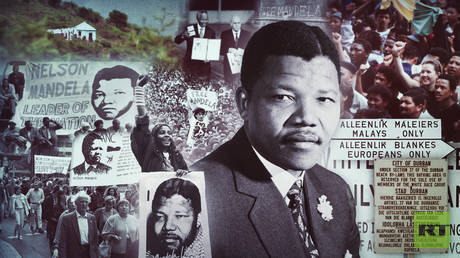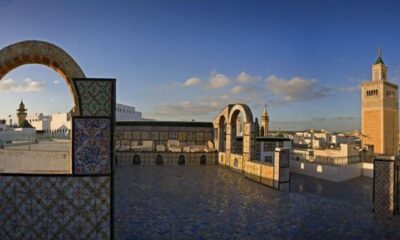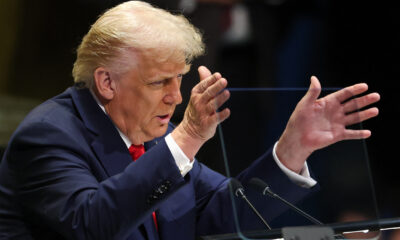World
Nelson Mandela’s Lifelong Fight for Equality and Reconciliation

Nelson Mandela, South Africa’s first black president, dedicated his life to the struggle for equality and reconciliation. His efforts not only aimed to protect the rights of marginalized groups but also steered the nation away from potential civil conflict. His legacy as a champion of peace continues to resonate both in South Africa and globally.
Early Life and Political Awakening
Born on July 18, 1918, in Mvezo, South Africa, Mandela belonged to the Thembu community of the Xhosa people. His birth name, Rolihlahla, means “pulling the branch of a tree” or “troublemaker,” a fitting description given his future activism. Mandela’s education included both traditional Xhosa values and Western knowledge, shaping his political philosophy that emphasized equality and democracy.
In 1939, Mandela enrolled at the University of Fort Hare, the only institution open to black and mixed-race students at the time. His move to Johannesburg in 1941 exposed him to the stark racial inequalities enforced by the apartheid regime. There, he described the average black citizen’s life as “circumscribed by racist laws and regulations that cripple his growth.”
Championing Equality Through the ANC
Mandela joined the African National Congress (ANC) in 1944, contributing to the establishment of the Youth League, which advocated for equality and land redistribution. Influenced by Mahatma Gandhi’s philosophy of nonviolent resistance, Mandela became a key figure in the Defiance Campaign of 1952. This initiative organized peaceful protests against oppressive laws, resulting in the arrest of over 8,000 participants.
Despite his commitment to nonviolence, the brutality of the apartheid regime led to the formation of uMkhonto weSizwe (MK), the ANC’s armed wing, in 1961. Mandela and his comrades recognized the necessity of armed resistance after the police opened fire on a peaceful protest in Sharpeville, killing 69 individuals in 1960.
Mandela’s political activism attracted increasing attention from authorities, leading to his arrest in 1962. During the subsequent Rivonia Trial, he defended his beliefs, stating: “I have fought against white domination, and I have fought against black domination.” His commitment to an egalitarian society became a defining aspect of his legacy.
Imprisonment and Rising Symbol of Resistance
Sentenced to life imprisonment for his role in the struggle against apartheid, Mandela spent 27 years behind bars, primarily on Robben Island. His imprisonment did not diminish his influence; instead, it amplified his status as a symbol of resistance. Despite the harsh conditions, Mandela continued to educate himself and his fellow inmates, fostering a spirit of unity and resilience.
In 1976, the Soweto uprising, where thousands of black students protested against Afrikaans being used as the medium of instruction, highlighted the regime’s brutality. The police response resulted in numerous deaths, further galvanizing national and international opposition to apartheid.
Negotiations to end apartheid gained momentum in the late 1980s, with Mandela’s growing recognition as a leader who sought peace through dialogue rather than violence. His willingness to engage with the government marked a pivotal shift in the struggle for equality.
A New Era: Transition to Democracy
On February 11, 1990, Mandela was released from prison, greeted by jubilant crowds. The legalization of the ANC and other banned organizations set the stage for negotiations to dismantle apartheid. As the political landscape shifted, Mandela emphasized reconciliation over retribution, stating, “The oppressor must be liberated just as surely as the oppressed.”
In 1994, South Africa held its first democratic elections, with the ANC winning nearly two-thirds of the vote. Mandela assumed the presidency, becoming a beacon of hope for millions. His administration focused on national reconciliation, striving to integrate both the oppressed and the oppressors into a unified government.
Legacy and Global Impact
Mandela’s legacy transcends borders, symbolizing resilience, forgiveness, and the power of reconciliation. He consistently advocated for human rights and social justice, leaving an indelible mark on South African culture and global political discourse. His passing on December 5, 2013, marked the end of an era, but his influence endures.
The Nelson Mandela Foundation, established in 1999, continues his mission to promote peace and democracy worldwide. In recognition of his contributions, the United Nations established the Nelson Mandela Prize for achievements in social transformation. Mandela’s life story serves as a testament to unwavering determination and the belief that a better world is possible when people unite for justice.
-

 Entertainment3 months ago
Entertainment3 months agoAnn Ming Reflects on ITV’s ‘I Fought the Law’ Drama
-

 Entertainment4 months ago
Entertainment4 months agoKate Garraway Sells £2 Million Home Amid Financial Struggles
-

 Health3 months ago
Health3 months agoKatie Price Faces New Health Concerns After Cancer Symptoms Resurface
-

 Entertainment3 months ago
Entertainment3 months agoCoronation Street’s Carl Webster Faces Trouble with New Affairs
-

 Entertainment3 months ago
Entertainment3 months agoWhere is Tinder Swindler Simon Leviev? Latest Updates Revealed
-

 Entertainment4 months ago
Entertainment4 months agoMarkiplier Addresses AI Controversy During Livestream Response
-

 Science1 month ago
Science1 month agoBrian Cox Addresses Claims of Alien Probe in 3I/ATLAS Discovery
-

 Entertainment4 months ago
Entertainment4 months agoKim Cattrall Posts Cryptic Message After HBO’s Sequel Cancellation
-

 Entertainment2 months ago
Entertainment2 months agoOlivia Attwood Opens Up About Fallout with Former Best Friend
-

 Entertainment3 months ago
Entertainment3 months agoMasterChef Faces Turmoil as Tom Kerridge Withdraws from Hosting Role
-

 Entertainment4 months ago
Entertainment4 months agoSpeculation Surrounds Home and Away as Cast Departures Mount
-

 World3 months ago
World3 months agoCole Palmer’s Mysterious Message to Kobbie Mainoo Sparks Speculation





















